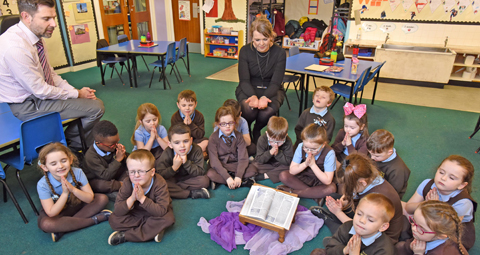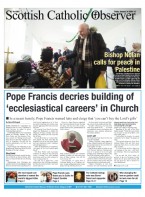March 9 | ![]() 0 COMMENTS
0 COMMENTS ![]() print
print

A golden time for Christian meditation
ERIN BYRNE visits a Catholic school in Glasgow and finds spirituality is driving educational attainment BY ERIN BYRNE
Tucked away in a corner of north Glasgow on a busy Friday afternoon, a smiling band of boys and girls in P4/5 gather in a circle in the centre of their classroom. A brightly-coloured display hangs on the wall just above the heads of the pupils at St Blane’s Primary School. It reads, ‘We are each unique and beautiful but together we are a masterpiece.’
Eyes closed, they sit still and quiet. Some hold on to Rosary beads wound loosely around their fingers. A piece of sacred music plays before a powerful silence falls across the room. Finally, after several minutes, the music begins again and the word ‘Maranatha’—Come Lord Jesus—is whispered softly, over and over, and over. As meditation comes to an end, several children excitedly tell me why they enjoy the daily practice. Eight-year-old Kiera said: “I like that we all sit together. It makes me feel calm.”
Connor, 9, added: “We do it every day. I like the music. It’s nice and quiet.”
Erin, 8, said: “You can reflect on your day. It’s relaxing.”
Further along the corridor, I find a lively P1 class huddled around a Bible and a flickering candle, neatly placed on the floor. Legs crossed, hands joined: they can’t wait to begin.
Gently closing their eyes, they sit patiently for a couple of minutes in perfect silence. Then in resounding chorus at their teachers’ request, ‘ma-ra-na-tha,’ (decibels x 100,000)!
Afterwards, Declan, five, told me why he likes Christian meditation. “It’s nice and quiet and I get to think about God,” he said.
Jayden said: “I like it because everyone is sitting around me and it makes me concentrate.” Daniel said: “It’s peaceful and I like being with my friends.”
Riley added: “It makes me happy.”
The beauty of Christian meditation lies in its simplicity. “Meditation is a universal spiritual practice which guides us into this state of prayer, into the prayer of Christ,” Fr Laurence Freeman OSB, director of the World Community for Christian Meditation, said. “It brings us to silence, stillness and simplicity by a means that is itself silent, still and simple.”
It involves the repetition of a single word faithfully and lovingly during the time of meditation.
Staff and pupils at St Blane’s have embraced Christian meditation unreservedly. All children participate every day, in a way most suited to reflect their age and stage of learning.
Principal teacher Ms Gilfillan said: “Our daily meditation helps create a calm and peaceful atmosphere in class. We all juggle the everyday pressures of life at home and at school, and our pupils are no different.
“A few minutes being still and silent fosters resilience and helps focus minds for the rest of the day.”
Acting headteacher Mr Bourke said: “One of the benefits of Christian meditation is its inclusiveness. Every child is encouraged to participate fully regardless of his or her background, faith, belief or ability.
“It has helped cultivate a real sense of togetherness and reflection across the whole school. We hope that by investing in these important moments, our pupils will grow in strength and confidence, both academically and spiritually.”
This investment in spiritual development accords with a growing body of evidence which shows that good spiritual health can have a positive impact on mental and physical wellbeing. A study published in January in the International Journal of Public Health surveyed more than 26,000 pupils aged 11–15 years in Scotland, England and Canada and found that higher levels of spiritual health were associated with higher likelihoods of positive health outcomes.
Indeed, good health and wellbeing in the formative years of primary and secondary education are established predictors of positive social and emotional development. Moreover, the right to spiritual development is enshrined in the United Nations’ Convention on the Rights of the Child (General Assembly, UN 1989). Young people want to feel safe and secure, to be treated with dignity and respect, and to feel that they belong, are valued and are trusted.
That is why in Catholic schools children are nurtured and cared for in an environment that promotes the unique dignity of each person, made in the image and likeness of God.
Professor John Swinton, chair in divinity and religious studies at the University of Aberdeen defines spirituality as ‘that aspect of human existence that gives it its humanness.’
“It concerns the structures of significance that give meaning and direction to a person’s life and helps them deal with the vicissitudes of existence.
“As such it includes such vital dimensions as the quest for meaning, purpose, self-transcending knowledge, meaningful relationships, love and commitment, as well as [for some] a sense of the holy amongst us.”
Spiritual practices such as spending time in prayer, reading Scripture and listening to or playing sacred music can help us develop the better parts of ourselves. Spiritual practices can ‘help us to become more creative, patient, persistent, honest, kind, compassionate, wise, calm, hopeful and joyful.’
These aren’t the words of Pope Francis, the Dalai Lama or even the minister for public health. Rather, this is evidence gathered by the Royal College of Psychiatrists, the professional body responsible for education and training, and setting and raising standards in mental health. Scientists have found, time and again, that those with a spiritual practice tend to be happier than those who don’t. Indeed, spirituality has the potential capacity to help us search for connectedness, meaning and purpose in an increasingly individualistic and secular society.
St Blane’s pupils enjoy Christian meditation because it helps them ‘concentrate,’ ‘be calm’ and ‘feel close to God.’
In a challenging world, when our complex and fast-paced lives are so often viewed through a small screen and deceptive filter, perhaps the innate simplicity of being still in the silence with God, is just what the doctor ordered










